Prayer

When it comes to living small,
you were ahead of your time,
which is why I nominate you
patron saint of tiny homes. So
you haven’t heard of them?
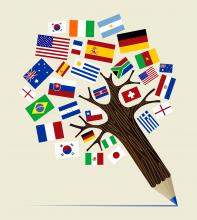
People of faith can play an important role in helping each child of God realize his/her potential. Join us in standing up for education by signing the #UpForSchool petition, an urgent appeal to get every child into school—no matter who they are or where they are born.
When we invest in schooling for all children, lives are transformed for generations to come. For example, closing the education gap for girls reduces child marriage rates, leads to more income later in life, and lowers the rate of HIV/AIDs. Access to equal education is not only essential to building stronger economies and a healthy society, but it honors the God-given dignity of children.
My mom would agree: education is empowerment. It provides freedom and a better future—and no child in the world should be denied it.
Let us all pray that every child can go to school.
And let’s join other faith communities to make sure it happens—sign the petition now.
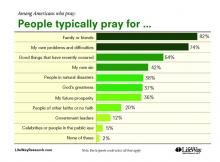
When Americans aren’t busy praying for themselves or their own needs — and most of them are — many are seeking divine intervention on behalf of a favorite sports team or the golden ticket in the lottery, according to a new survey.
About 13 percent of Americans who pray say they pray for sports teams, compared with about one in five (21 percent) who say they have prayed to win the lottery, the new survey from LifeWay Research suggests.
A survey earlier this year from Public Religion Research Institute suggested that more Americans (26 percent) pray for their sports team, while more than seven in 10 (73 percent) say they have never done this.
Some of LifeWay’s new survey’s main findings include:
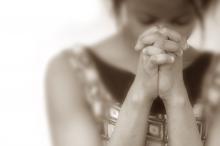
Our shoulders touched slightly like links in a chain, kneeling around a small twin bed, our heads bowed, eyes closed: “ Our Father who art in heaven,” we mimicked, as mama kneeling at the foot of the bed, led us in prayer.
I was four, the second to the youngest child, and the other three were stair steps ahead of me. Hanging on to mama’s every word, we acted as though we didn’t take notice of the sorrow in her voice, the cries that lingered outside her bedroom door just hours ago.
Soon, she would lay in a Philadelphia hospital bed with stitches from the top of her chest down to her navel, and be told to kiss her five babies goodbye because my father had beaten her so badly that he burst both her lungs.
Decades later, I would sit across from her taking notes for Color Me Butterfly, as she told me the story:
I lay there listening to that doctor tell me that I wouldn’t make it through the night, she mused, her face drawn into the memory. I prayed, listened as God spoke to me, told me that I couldn’t let nary a soul touch me—not the doctor, the nurse, not even my own mother and chi’ren. He was gonna see to it that I walked out of that hospital, but I had to trust Him.
Now, as I think back on that day my mother stared into the abyss, as though she could still see the stitches that cinched her chest, I thank God that she was a praying woman.

On September 21, Leonard Cohen Turned 80. With or Without a Cigarette, It’s Time to Celebrate.
“I hope I stay on the road a little bit longer - but you may not be so enthusiastic when you hear my reason. You see I want to start smoking next year when I'll be 80. It's been a long barren time. I think it’s the right age to recommence.” —Leonard Cohen
I dreamed you were in Florence, singing on some stage. Your back was to the men, the women by your sides. Your melody was tranquil, just humming do-re-me-fa, la-fa-re-me-do. And when there was commotion, some men quarreling behind the scene, you turned and faced them calmly, beseeching, “Gentlemen, let’s sing.”
You have left us these past months, ceased your universal tour. It gives us time to miss you, and wonder what you mean. This week you will be eighty, there’s no question, you are old. Your bones may creak or ache and I’ll guess your heart’s a little tired, but from outside looking in you seem settled in a pretty gentle space.
So in the dream your melodies kept coming, like a river from its source. “You’re doing it,” someone shouted. “It’s exactly what we want!” People were casually swaying until your voice started to get hoarse. “Well, I’m glad you like it,” you croaked joyfully, “I call this solemn mingling my little Florentine Prayer.”
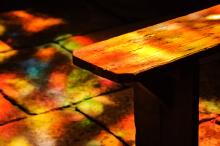
Andrew W.K. at the Village Voice received a question from someone whose brother was diagnosed with cancer. In his grief, he is frustrated by his grandma’s prayers and sees them as “superstitious nonsense.” Andrew’s brilliant response is a very worthwhile read, in which he positions prayer as a posture of humility, a deep realization of our smallness.
When senseless tragedy occurs, people of faith often rush to explain and control. As finite human beings, we are limited in our knowledge and power, which makes us uncomfortable. When we encounter something incomprehensible, we are driven to explain it. When a situation reels out of control, we long to control it. We invite God to fill those gaps of our discomfort, our lack of understanding and control.
We look for redemption stories, the ways God is bringing about good through a tragic situation. We do this to avoid letting the grief overwhelm us. Like grandma, we pray because we are hoping to claim some power in our helplessness. Our prayers end up being more beneficial for ourselves than the person we are actually praying for.
Unfortunately, what happens then is we cease to need God beyond the quick explanation. We’ve tidied up the situation with reverent prayers and spiritual meaning. We’ve quickly salvaged the ecosystem of our faith despite a tragic intrusive incident — our belief in the God of the gaps remain intact. Everything stays the same. When we do this, we are making God into an idol, one that explains and controls according to our sensibilities.

The reality of climate change can be tough information to absorb, and if you’ve known for a while, it can just plain get you down. Yes, rising carbon pollution is leading to global warming. The impacts are already happening now, especially in poor countries and on our coasts. So now what? In the face of a problem on a global scale, what are we to do? Here are four suggestions.
1. Pray.
The massive scale of global warming is a reminder that we are only human. It’s overwhelming to think about and difficult to know where to start. The good news is, God is waiting for us to hand over all our burdens. This is God’s world, not ours – a perspective that can inform not only our outrage over what humans have done to the creation, but also our response. We can be the hands and feet of Christ, doing the work God calls us to do, but we are not the saviors of the world. Knowing that can be both humbling and strengthening. Prayer is a great place to start if you’re trying to figure out what to do about climate change, and it’s an equally important place to return to if you’ve been fighting the good fight for years (exhaustion and burnout are a real thing in this line of work!).
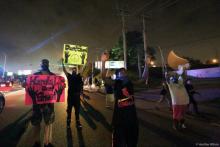
I have so much emotions and thoughts in my mind, heart, and body – in light of the oh-so-much that is going on all around the world – including the utterly tragic, brutal, and unnecessary “death” of Michael Brown.
But I thought it would be helpful to share a few thoughts how churches, Christians, and leaders can be engaging the events of the past 11 days in their respective churches – now and in the future. I’m not suggesting that pastors have to completely alter their sermons or Bible studies, but to altogether ignore the injustice of Michael Brown’s death would be altogether foolish.
To be blunt and I say this respectfully,
The integrity of the church is at stake because when it’s all said and done, it’s not a race issue for me — it’s a Gospel issue. It’s a Kingdom issue. We shouldn’t even let isolated issues in themselves hijack the purpose of the church. The Gospel of Christ is so extraordinary that it begins to inform (and we pray, transform) all aspects of our lives. So, in other words, we talk about race and racism because we believe in the Gospel.
So, here are five suggestions for Christians, leaders, and churches.

THE RECENT Supreme Court ruling permitting prayer at government functions holds many ramifications for our day-to-day life, such as getting a comfortable seat at the city council meeting before the clerk starts reading the entire book of Revelation.
In writing for the majority, Justice Anthony M. Kennedy held that public prayer is “deeply embedded in the history and tradition of this country” and should be permitted as a ceremonial practice. Like, maybe at the D.C. Department of Motor Vehicles:
Driver: I’m here to renew my driver’s license.
DMV clerk: Let us pray.
Driver: Excuse me?
DMV clerk: With every head bowed, and every eye closed, we pray to the Lord Jesus Christ that his love will pour out on this driver, and by the grace of the Living God, he will always come to a complete stop, when appropriate.

The first time we visited my sister in her monastery
Was just after one of our sons had survived massive
Surgeries, before and during which all the monks &
Nuns in the monastery, not to mention thousands of
Other generous souls, had prayed constantly for him
And it turned out that they had gone over the million
Prayer mark for our son, which, according to the law
Of the monastery, gave him lifetime privileges. He’s
No dolt, this kid, and he took off running, to hammer
On drums, and eat the cookies on an altar, and pursue
The grim local peacocks, who were deeply aggrieved.

Just because interfaith, interracial, and varied ethnic groups share a common cause doesn’t mean a diverse coalition can hang together.
It often takes prayer. And not just a “Bless this group, Amen,” invocation.
A new study by three sociologists finds that three out of four interfaith civic coalitions turn to what the sociologists have dubbed “bridging prayer” — interactive, participatory, and often innovative prayers and rituals that highlight their shared identity as people of faith.

When you truly experience the love of God, there is nothing you won’t do for God. When you are truly thankful for salvation, no place is off limits to share the gospel. When you read Matthew 25, you are willing to dwell in any environment to be the hands and feet of Jesus. Our compassion compels us to love without conditions and work beyond the hours of Sunday morning.
We see the necessities of the people, so we respond with passion and purpose. However, we often push ourselves beyond measure and forget to allow God to nurture and nourish our own souls, so that we are able to pour out into others.
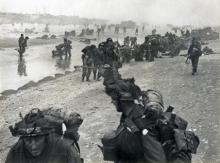
Just in time for the 70th anniversary of D-Day Friday, the U.S. Senate by unanimous consent passed a bill to include a prayer plaque at the National World War II Memorial in Washington, D.C.
“O Lord, give us Faith,” the prayer reads in part. “Give us Faith in Thee; Faith in our sons; Faith in each other; Faith in our united crusade.” It concludes: “Thy will be done, Almighty God.”
The U.S. House will have to approve the bill, known as the World War II Memorial Prayer Act of 2013, before it heads to President Obama’s desk for his signature. But political pundits say there is little doubt the House will approve the measure since it passed a similar version of the bill last year.
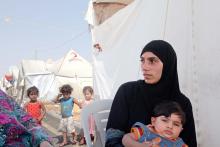
I wish I could sit beside you on a cushion on the floor and have a cup of tea with you. I would like to snuggle your baby in my arms. I would like to hear your story. I know you have a sad story, and if I heard it, I would weep.
I know you are good and loving women. I’m sorry you have lost so much. I’m sorry you had to come to a country, a city, and a house that is not yours.
I can imagine you in your own country, strong women serving others. I can imagine you making beautiful food and sharing it with your family and friends. I can imagine you caring for your mothers and daughters, fathers and sons, sisters and brothers and friends. Just the way I do.
Because that’s what women do. We are compassionate. We give. We serve. We protect. We work hard to make the world better for the people we love.
Wherever I go in the world, I discover that we women are very much alike. We may have different clothes. Different languages. Different cultures. Maybe our skin is a different color. But in our hearts, we are the same.
That’s why we can look into each other’s eyes and feel connected. We can talk without using words. We can smile. We can hug. We can laugh.
And sometimes, we can feel each other’s pain. I have prayed that God would help me feel your pain. I wish I could remove your pain. I wish I could help you carry it.
YOU DON’T HAVE to be an environmentalist to wonder about technology. Will it be our great savior or another thorn in the flesh, another opportunity to hear Thoreau’s lament about the tendency of humans to “become the tools of their tools”?
This excellent collection of prayers and worship materials, From the Psalms to the Cloud, helps us understand the tool of technology. It is a very green book while also being useful. It is green because it gives us a way out of the totalitarian world of the market and into a world that we make with words.
Just about everybody is on the other side of the “time famine” and the “trust famine” and deep into digital and connectivity overload. By time famine I mean the pervasive sense that there is not enough time to do what we want, so subjugated is our time to technology, forms, and robotic requests for information. By trust famine I mean all that time we spend worrying about time and wondering if somebody else is in charge. Are we in charge of our tools and our time or are our tools and time in charge of us?
In this optimistic book, the prophets arrive. Mankin and Tirabassi ask the right question: Can a technology devoted to advertising be useful to spirituality? They answer with a careful yes, taking us on the long road from the Psalms to Twitter, by way of “vintage wine in vintage wineskins, uncorked.” These two writers gather the wisdom of dozens of beautiful writers of prayers and liturgies and show us a way to go deep digitally. Whether they are praying for energy that will “deeply change all of our clocks,” or for the return of the time when churches giving sanctuary for immigrants will become again “dusty places with pews,” or in any of John Dannon’s exquisite doxologies for the natural and ecclesiastical seasons, or encouraging us to “spend a day saying nothing that doesn’t need saying.” The prayer topics move through addiction to pregnancy to a ritual for quitting a job. What a great ask this is for those confused or overdone with technology: We pray “for a trap door when we hit rock bottom.”
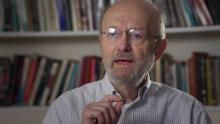
MY DEAR FRIEND Glen Stassen passed away on April 26. Glen was a key ally, a kindred spirit, and a deeply respected member of the Sojourners board. In my view, Glen was the most important Christian ethicist of his time because he taught us what it means to follow Jesus.
Many years ago a tall, thin, and very bright young man came to visit Sojourners community in Washington, D.C. He told us he was an ethics professor at Southern Baptist Theological Seminary, and that he wanted to live with us and volunteer serving the poor. Glen stayed in one of our households and served on our food line, distributing bags of groceries to low-income families just 20 blocks from the White House. From my first conversation with him to the last, Glen Stassen never stopped talking about Jesus—and how Christians must not just believe in Christ in word but also follow him in deed. His most influential book, Kingdom Ethics, co-authored with David P. Gushee, was also the passion of his life and work.
Before Glen became a professor, he had a promising career in nuclear physics. He loved his work, but he was not willing to work in weapons development so he left to attend seminary and become a biblical scholar. Eventually, Glen formulated a powerful vision of “just peacemaking.” Using the creative and critical practices of conflict resolution, Glen’s framework guides us toward effective and faithful actions to both prevent and end wars.
In everything he did, Glen sought to bring Christian ethics to public life. Working with Glen on the Nuclear Weapons Freeze Campaign, I quickly discovered that he was not just an ethics theorist but a gifted practitioner who knew how to mobilize movements and change public policy. As a true disciple of Jesus, Glen wanted to change the world.
![U.S. Navy photo by Photographer’s Mate 2nd Class Daniel J. McLain [Public domain], via Wikimedia Commons.](https://sojo.net/files/styles/medium/public/blog/US_Navy_040526-N-0295M-036_The_Commemorative_Area_of_the_National_World_War_II_Memorial-427x283.jpg)
An interfaith coalition has again asked the U.S. House of Representatives to reject a prayer plaque at the World War II Memorial in Washington, D.C.
The proposed plaque, which is under the consideration of a House subcommittee, would feature a prayer spoken by President Franklin Delano Roosevelt on the radio on D-Day, June 6, 1944.
“O Lord, give us Faith,” it reads in part. “Give us Faith in Thee; Faith in our sons; Faith in each other; Faith in our united crusade.” It concludes with, “Thy will be done, Almighty God.”
The coalition — a mix of religious and secular organizations that includes the Center for Inquiry, a humanist organization; three Jewish groups; the Hindu American Foundation; and the United Methodist Church – said the prayer does not reflect the religious diversity of the United States.
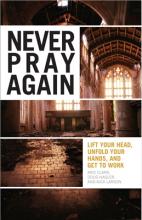
There’s a place in the cultural conversation for both friars and fools, for those who discern truth through contemplation and prayer, as well as those who seek to reveal it through satire and silliness. But it’s not every day that both come together for substantive (if not always serious) theological conversation.
Aric Clark, Nick Larson, and Doug Hagler, also known online as Two Friars and a Fool, host such conversations on their blog and podcast about theology and spiritual practice, sexuality, and popular culture. They recently combined forces as well for their first book, Never Pray Again: Lift Your Head, Unfold Your Hands and Get to Work. The intentionally provocative title emphasizes the need for Christians to get outside of our own heads and churches, and about the business of being the hands and feet of Jesus in a world in need.
I chatted with the trio recently about their new project, as well as the “Never Pray Again” coloring book, which they crowd funded through a recently successful Kickstarter campaign.
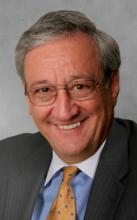
The great rejoicing after the U.S. Supreme Court’s recent ruling on public prayer reminded me of the infamous line from an officer who commented on the destruction of a village during the Vietnam War: “We had to destroy the village in order to save it!”
There isn’t much to celebrate in the high court’s decision in Greece v. Galloway to allow sectarian prayers to be spoken in all kinds of public meetings. The big loser in this judicial decision was prayer itself — its uniqueness and its authenticity.

EVER SINCE ADAM AND EVE ate themselves out of house and home, we’ve experienced a brokenness in our lives. Rather than offer praise for God’s wondrous acts, we attempt to build God’s kingdom ourselves. Rather than tell of God’s greatness, we whine that religious obligation demands too much. Rather than involve ourselves in the community, we divide into factions over whether we should work or pray, wait or proceed. Still trying to be more god-like than accepting the assignment to bear God’s image in the world, we attempt to make a name for ourselves. The result? Human-initiated plans cast in language that parodies God’s own plan, pitting human counsel against divine. Setting nation against nation.
Pentecost marks a special occasion in the life of the Christian community. This extraordinary record of what we call the “birthday of the church” is less often noted as the 50th day after Passover—a day to pause, gather, and remember the great acts of God. Passover marks the liberation of the enslaved children of Israel from Egyptian oppression, and Pentecost is the moment “the Holy Spirit is poured out by God ... to empower the church to advance Christ’s mission to the very ends of the earth,” as David P. Gushee puts it.
The Pentecost mission involves patience with God’s timing, which is submission to God’s will. Meanwhile, rather than looking up for Christ’s return, we look for opportunities to be evidence that the kingdom has come.